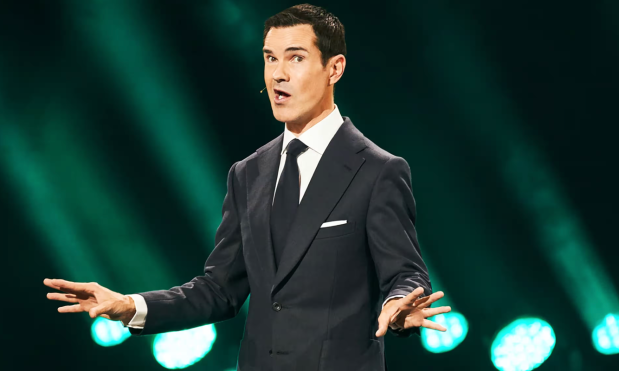How to Become a Tyrant(Netflix) is ideal history TV for Generation No Attention Span. Presented in six bite-sized chunks by Peter Dinklage, aka the ‘Imp’ Tyrion Lannister from Game of Thrones, it tells you most of the things you need to know about Hitler, Stalin, Mao, Gaddafi, Kim Il-Sung, Idi Amin and Saddam Hussein, without obliging you to think or grapple with any tedious detail.
Instead of examining the dictators individually, it explores their careers thematically, looking for the ingredients they have in common. It’s split into half-hour episodes — ‘Seize Power’, ‘Crush Your Rivals’, ‘Reign Through Terror’, ‘Control the Truth’, ‘Create a New Society’, ‘Rule Forever’ — which mix contemporary film footage with attractive animation.
I actually quite like this ongoing trend towards shorter TV. Many of my favourite series last half an hour or less: Cobra Kai; Rick and Morty; Community; Midnight Diner. It feels like less of an intrusion on one’s time, less presumptuously demanding, in the same way that eating at the bar so often seems a preferable option to sitting down in the restaurant proper where you have to go through the full rigmarole.
Also, the concept behind the series seems fundamentally sound. Though I haven’t read the book on which it is based — The Dictator’s Handbook: Why Bad Behavior is Almost Always Good Politics — it does appear to come from the right place, a position of well-informed cynicism. Written by two political scientists, Alastair Smith and Bruce de Mesquita, it develops the assertion that ‘Leaders do whatever keeps them in power. They don’t care about the national interest.’ I’m sure this is absolutely correct and that it applies to almost all politicians in all eras — and not merely in dictatorships.
This was especially noticeable in the episode dedicated to propaganda. It focused mainly on Stalin’s Soviet Union but what went unsaid was just how many of the techniques we associate with evil totalitarianism are fully in play today. Airbrushing opponents out of history? Today, Big Tech enforces cancel culture with a ruthlessness that would make Koba the Dread blush. Fake martyrs? Stalin’s propagandists invented Pavlik Morozov, the Soviet boy hero supposedly killed by angry relatives after, quite properly, he denounced his father to the authorities for anti-Communist behaviour. George Floyd, to be fair, did actually exist. But I’m not convinced that the way his death was exploited by Marxist groups like Black Lives Matter was any less shamelessly manipulative.
Then there’s junk science. Stalin infamously promoted a dodgy geneticist called Trofim Lysenko because his dubious theory that seeds could be ‘educated’ into greater productivity for the motherland felt like an appropriately Soviet idea. Today Lysenko would almost certainly be flying first class later this year to the COP26 conference in Glasgow, and speaking out with similar expertise on the urgent need to address man-made climate change.
Thanks to Boy I have discovered, besides Rick and Morty, a cultural phenomenon called Bo Burnham. If you’re my generation, the name of this American comic and musician will mean nothing, but your kids will know all the lyrics to his naggingly catchy songs which are often featured in TikTok videos. His videos on YouTube have had nearly 400 million views, which means he can now earn top dollar for his occasional TV specials like his latest one for Netflix, Bo Burnham: Inside.
As you might expect from a millennial, Burnham’s comedy is achingly meta (and tortured and embarrassed by this fact), technically accomplished (he edited, directed, recorded, lit, etc this entire project, solo, in a single home studio during one of the interminable lockdowns) and frustratingly slight. It’s not even sure whether it wants to be funny or not, for fear, perhaps, that with humour comes cruelty.
For example, there’s a nice number he does called White Woman’s Instagram, whose title smacks of prissy generational guilt. I don’t think it would have occurred to a comic my age to have specified skin colour: surely the artfully contrived, fluffily trite, slightly pretentious tropes of Instagram (fuzzy, comfy socks; a coffee table made out of driftwood; a bobblehead of Ruth Bader Ginsburg; a needlepoint of a fox; some random quote from Lord of the Rings incorrectly attributed to Martin Luther King), which he lightly satirises here apply to all young females, not just Caucasian ones?
I’m not saying he’s not a talented, amiable fellow who doesn’t write hummable tunes on his keyboard (he reminds me of Magnetic Fields’ 69 Love Songs). But George Carlin he ain’t and nor, more’s the pity, does he want to be.
Got something to add? Join the discussion and comment below.
Get 10 issues for just $10
Subscribe to The Spectator Australia today for the next 10 magazine issues, plus full online access, for just $10.
You might disagree with half of it, but you’ll enjoy reading all of it. Try your first month for free, then just $2 a week for the remainder of your first year.















Comments
Don't miss out
Join the conversation with other Spectator Australia readers. Subscribe to leave a comment.
SUBSCRIBEAlready a subscriber? Log in